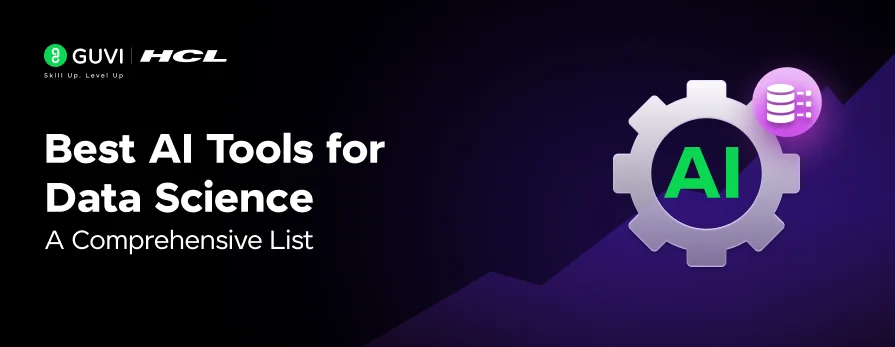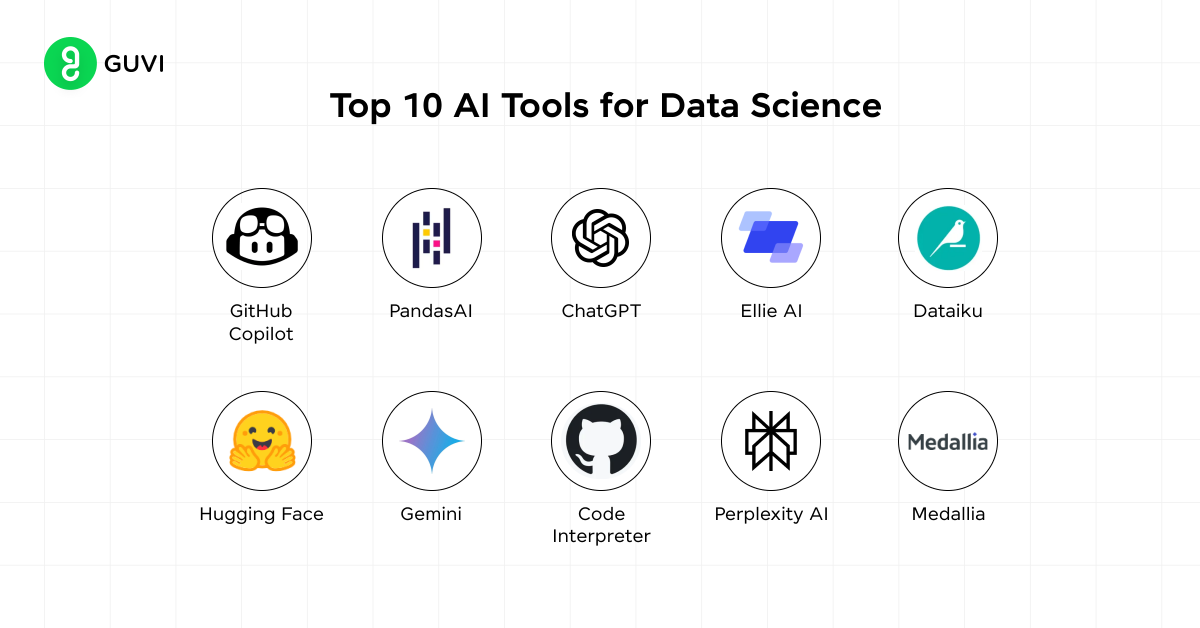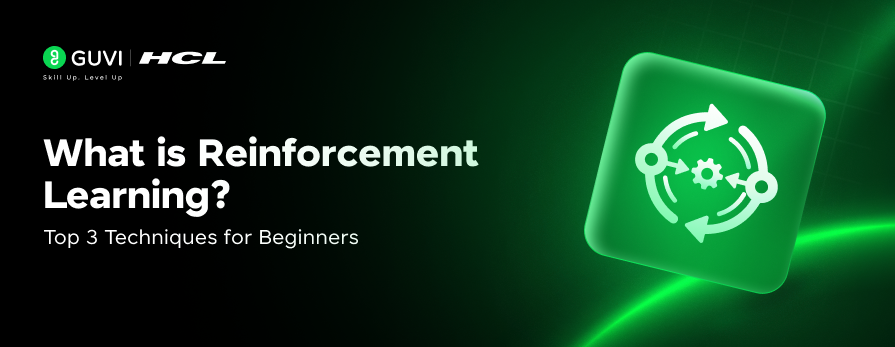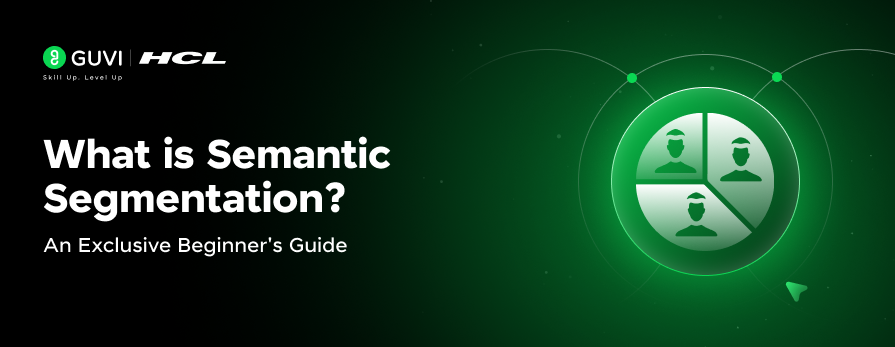
Best AI Tools for Data Science: A Comprehensive List
Jul 02, 2025 6 Min Read 5199 Views
(Last Updated)
As the name suggests, data science is all about working with data and derive insights from it! The process of data science itself is a bit tiring.
In order to make it easy and tireless, there are a lot of AI tools for data science. That is what we are going to see in this article! A comprehensive list of famous AI tools for data science that we have segregated based on its features, compatibility and ease of integration.
So, let us get started!
Table of contents
- Top 10 AI Tools for Data Science – Overview
- Best AI Tools for Data Science
- GitHub Copilot
- PandasAI
- ChatGPT
- Ellie AI
- Dataiku
- Hugging Face
- Gemini
- Code Interpreter
- Perplexity AI
- Medallia
- Conclusion
- FAQs
- What are the best AI tools for Data Science?
- How can AI tools improve the data science process?
- Which AI tools are most recommended for beginners in data science?
- What factors should be considered when choosing an AI tool for data science?
- Which AI tools are best suited for large-scale data processing in data science?
- What are the limitations of using AI tools in data science?
- What future trends are expected in the development of AI tools for data science?
Top 10 AI Tools for Data Science – Overview

Here’s an overview of the top 10 AI tools for data science:
| S.No. | Tool Name | Features | Compatibility | Ease of Integration | Access Now |
| 1 | GitHub Copilot | AI-powered code generation, automates code tasks | Python, JavaScript | Easy to integrate with your workflow | Try Now |
| 2 | PandasAI | AI-enhanced data analysis using Pandas | Python | Medium | Try Now |
| 3 | ChatGPT | Language model for generating insights | Python, APIs | Easy to integrate with your workflow | Try Now |
| 4 | Ellie AI | Automated data cleaning and preprocessing | Python, R, Cloud | Easy to integrate with your workflow | Try Now |
| 5 | Dataiku | End-to-end data science platform, collaboration | Python, R, SQL, Cloud | Easy to integrate with your workflow | Try Now |
| 6 | Hugging Face | NLP models for advanced data processing | Python, APIs | Easy to integrate with your workflow | Try Now |
| 7 | Gemini | Advanced ML and AI-powered data tools | Python, R, Cloud | Easy to integrate with your workflow | Try Now |
| 8 | Code Interpreter | AI-assisted code debugging and exploration | Python, R | Medium | Try Now |
| 9 | Perplexity AI | AI-powered search and insights generation | Python, APIs | Medium | Try Now |
| 10 | Medallia | Text analysis and NLP for data classification | Python, R, APIs | Medium | Try Now |
Best AI Tools for Data Science
You have seen the overview of the tools that we are going to see in this article but it is not enough to assume which would be the best for you.
So, let us see a detailed explanation of all the AI tools for data science mentioned above!
1. GitHub Copilot
GitHub Copilot is a groundbreaking AI-powered tool designed to assist with code generation and automation, specifically for data science process.
Developed by GitHub and OpenAI, Copilot integrates seamlessly into coding environments like Visual Studio Code to help write code, suggest functions, and automate repetitive coding tasks.
Core Features:
- Real-time code suggestions and completions
- Automates repetitive code-writing tasks
- AI-driven error detection and corrections
- Built-in integration with GitHub repositories
Compatibility: Python, JavaScript
Ease of Use: Very easy—ideal for automating code generation
Supported Data Types: File types of CSV, JSON, SQL are supported.
Integration Capabilities: Works with GitHub, Jupyter Notebooks, and other coding platforms
Scalability: Scales well for both small and large coding projects
Security: Follows GitHub’s security protocols for secure code management
Visualization Capabilities: Not applicable for data visualization
User Reviews and Ratings: 4.5 / 5 (Source: G2)
Pricing: It has both free and paid versions that start from 230 INR and go to 1770 INR.
Try Now: GitHub Copilot
2. PandasAI
PandasAI is an AI-powered extension to the popular Pandas library in Python. It enhances the standard Pandas functionality by automating data manipulation and providing intelligent recommendations for analyzing data, making it a great tool for data scientists who want to streamline their data workflows.
Core Features:
- Automates data frame manipulation
- Provides AI-driven insights and data analysis
- Works seamlessly with the Pandas library
Compatibility: Python
Ease of Use: Medium—best for those already familiar with Pandas
Supported Data Types: CSV, Excel, and JSON files are supported.
Integration Capabilities: Fully integrates with Python’s Pandas library
Scalability: Great for small to medium datasets, scalable for larger projects with cloud integration
Security: Depends on the user’s Python environment security measures.
Visualization Capabilities: Works with Matplotlib and Seaborn for data visualization
User Reviews and Ratings: Trusted by GitHub users and gave 12.5K stars for this application. (Source: GitHub)
Pricing: Free and has a paid version for Plus users that starts from 43800 INR/year.
Try Now: PandasAI
3. ChatGPT
ChatGPT, developed by OpenAI, is an advanced language model that can assist data scientists by generating explanations, creating insights, and even suggesting code snippets.
Although it was primarily designed for natural language processing, ChatGPT has shown great potential in automating parts of the data science workflow.
Core Features:
- Generates explanations and insights from data
- Can assist with writing and debugging code
- Offers quick answers to technical questions
Compatibility: Python, APIs
Ease of Use: Very easy—very intuitive and beginner-friendly
Supported Data Types: CSV, and JSON files are supported.
Integration Capabilities: Can integrate with Python codebases, Jupyter Notebooks, and other platforms via APIs
Scalability: Excellent for small tasks; for larger datasets, external tools like APIs are needed
Security: Secure usage depends on the integration setup
Visualization Capabilities: Works with other Python visualization tools like Matplotlib and Plotly
User Reviews and Ratings: 4.7 / 5 (Source: G2)
Pricing: It has both free and paid version that comes around 1900 INR/month
Try Now: ChatGPT
4. Ellie AI
Ellie AI focuses on automating the data cleaning and preprocessing phases of the data science workflow.
By using advanced algorithms, it automatically detects and resolves issues such as missing data, duplicates, and anomalies, allowing data scientists to focus on higher-level tasks.
Core Features:
- Automates data cleaning and preprocessing
- Detects missing values and duplicates
- Provides detailed data quality reports
Compatibility: Python, R, Cloud
Ease of Use: Very easy—ideal for streamlining data preparation
Supported Data Types: Files such as CSV, SQL, and JSON are supported.
Integration Capabilities: Works with Python and R environments and cloud-based data storage
Scalability: Suitable for both small and large datasets
Security: Secure data handling with encryption options
Visualization Capabilities: Provides basic visualizations for data quality
User Reviews and Ratings: 4.0 / 5 (Source: G2)
Pricing: Contact for pricing.
Try Now: Ellie AI
5. Dataiku
Dataiku is an end-to-end platform that supports the entire data science workflow, from data preparation and analysis to machine learning and model deployment.
It is known for its collaborative features, allowing data scientists, engineers, and business users to work together on large-scale projects.
Core Features:
- Supports the full data science lifecycle
- Easy-to-use visual interface for data preparation and model building
- Collaboration features for team-based projects
Compatibility: Python, R, SQL, Cloud
Ease of Use: Very easy—suitable for both beginners and experts
Supported Data Types: CSV, SQL, JSON, Excel
Integration Capabilities: Strong integration with cloud platforms, databases, and coding environments
Scalability: Scalable for both small and enterprise-level projects
Security: Enterprise-grade security with data encryption
Visualization Capabilities: Robust visualization tools built into the platform
User Reviews and Ratings: 3.5 / 5 (Source: Glassdoor)
Pricing: Free tier available with paid enterprise options that can be requested and known
Try Now: Dataiku
6. Hugging Face
Hugging Face is a leader in natural language processing (NLP) and has become essential for data scientists working with text data.
It provides pre-trained models and an easy-to-use library that simplifies implementing state-of-the-art NLP algorithms for tasks such as text classification, sentiment analysis, and language translation.
Core Features:
- Pre-trained NLP models for various tasks
- Easy integration with transformer models
- Large open-source community and support for custom models
Compatibility: Python, APIs
Ease of Use: Very easy—ideal for NLP beginners and experts alike
Supported Data Types: Text (JSON, CSV, plain text)
Integration Capabilities: Works with Python-based environments and cloud platforms like AWS
Scalability: Scalable for projects of any size, from small datasets to large language models
Security: Supports secure model deployment and encrypted data handling
Visualization Capabilities: Limited visualization, but integrates with external libraries like Plotly and Matplotlib
User Reviews and Ratings: 4 / 5 (Source: Gartner)
Pricing: It has free, Pro, and Enterprise versions where Pro costs around 755 INR and the Enterprise version starts from 2190 INR.
Try Now: Hugging Face
7. Gemini
Gemini is an advanced AI platform that specializes in automating machine learning and data science workflows.
It combines AI and machine learning to process large datasets, build predictive models, and provide actionable insights without the need for extensive manual intervention.
Core Features:
- AI-powered automation for data preprocessing and model building
- Supports large-scale machine learning operations
- Built-in data visualization and analytics tools
Compatibility: Python, R, Cloud
Ease of Use: Very easy—perfect for automating repetitive data science tasks
Supported Data Types: CSV, JSON, SQL
Integration Capabilities: Works with cloud platforms and programming environments such as Python and R
Scalability: Ideal for large datasets and complex machine-learning projects
Security: High-level data encryption and secure deployment
Visualization Capabilities: Includes advanced visual analytics for better model understanding
User Reviews and Ratings: 4.1 / 5 (Source: Gartner)
Pricing: It has free version as well as a paid version that ranges around 1600 INR/month
Try Now: Gemini
8. Code Interpreter
Code Interpreter is an AI tool designed to help data scientists debug and explore code more efficiently.
It automates code corrections, provides detailed explanations of errors, and can even suggest optimizations for better performance, making it an invaluable tool for data scientists working with large codebases.
Core Features:
- Automated debugging and error explanations
- Code optimization suggestions for better performance
- Supports multiple programming languages
Compatibility: Python, R
Ease of Use: Medium—ideal for debugging and code exploration
Supported Data Types: CSV, JSON, SQL
Integration Capabilities: Integrates well with Jupyter Notebooks and other Python-based environments
Scalability: Suitable for small- to medium-scale data science projects
Security: Offers secure debugging and encryption features for sensitive code
Visualization Capabilities: Limited but integrates well with visualization libraries
Pricing: Comes with ChatGPT Plus subscription that comes around 1900 INR/month
Try Now: Code Interpreter
9. Perplexity AI
Perplexity AI is a cutting-edge AI search tool that enhances data scientists’ ability to find insights quickly from large datasets.
It uses advanced algorithms to search through unstructured data, providing relevant information and insights that help data scientists make better decisions.
Core Features:
- AI-powered search for relevant insights from unstructured data
- Fast and efficient, tailored for big data environments
- Natural language processing to refine search queries
Compatibility: Python, APIs
Ease of Use: Very easy—intuitive interface for generating quick insights
Supported Data Types: CSV, JSON, SQL, unstructured text are the supported files
Integration Capabilities: Integrates with cloud services and Python environments for advanced data search
Scalability: Perfect for large datasets and big data projects
Security: Data encryption and secure API requests
Visualization Capabilities: Basic visualizations; can be paired with Python visualization libraries
User Reviews and Ratings: 4.8 / 5 (Source: Product Hunt)
Pricing: Free tier with paid options that starts from 3360 INR/month
Try Now: Perplexity AI
10. Medallia
Medallia is a user-friendly AI tool that specializes in text analysis and natural language processing.
It provides data scientists with pre-built models for tasks like sentiment analysis, keyword extraction, and classification, making it a go-to tool for those working with text-heavy data.
Core Features:
- Pre-built and customizable models for text analysis
- Offers sentiment analysis, keyword extraction, and text classification
- No coding required for basic tasks
Compatibility: Python, R, APIs
Ease of Use: Very high—no-code options available for non-technical users
Supported Data Types: Text data (CSV, JSON, SQL)
Integration Capabilities: Can integrate with Python, R, and other popular programming languages through APIs
Scalability: Suitable for small- to medium-scale text analysis projects
Security: Secure API connections and encrypted data handling
Visualization Capabilities: Basic visualizations for text classification results
User Reviews and Ratings: 4.6 / 5 (Source: Gartner)
Pricing: Contact for pricing.
Try Now: Medallia
At last, we came to the conclusion of our long list of 10 best AI tools for data science. We hope you find comfortable with these tools and make your workflow smooth and efficient!
If you want to learn more about Data Science and how it enhances your career profile, consider enrolling for GUVI’s Data Science Course which teaches everything you need and will also provide an industry-grade certificate!
Conclusion
In conclusion, finding the right AI tools for your data science projects can be daunting, but this list of the best AI tools for data science should help narrow down your options.
Each tool has its unique strengths, and the best one for you depends on your specific needs whether it’s automation, visualization, or scalability. Try a few and see which one works best for your data science journey!
FAQs
The best AI tools for data science include GitHub Copilot, PandasAI, ChatGPT, Ellie AI, and Dataiku, among others. These tools excel in various aspects, such as code generation, data analysis automation, natural language processing, and collaboration.
AI tools improve the data science process by automating repetitive tasks like code generation (with GitHub Copilot) or data cleaning (Ellie AI). Tools like PandasAI and Dataiku help streamline data analysis and model building, allowing data scientists to focus on higher-level tasks and insights.
For beginners, GitHub Copilot, PandasAI, and ChatGPT are highly recommended. These tools offer user-friendly interfaces and automate tasks that can otherwise be time-consuming, such as coding, data analysis, and natural language processing.
When choosing an AI tool for data science, consider factors like ease of use (e.g., GitHub Copilot for code suggestions), scalability (e.g., Dataiku for large projects), integration capabilities (e.g., PandasAI with Python libraries), and whether the tool supports your required data types.
For large-scale data processing, Dataiku and Gemini are highly recommended. These tools are built for scalability and support complex machine learning operations, handling massive datasets efficiently.
Some limitations of AI tools include dependency on pre-existing algorithms, which may not always suit specific niche tasks. For example, GitHub Copilot might suggest code that requires refinement for unique use cases.
Future trends in AI tools for data science will likely focus on greater automation, improved collaboration, and enhanced model transparency. Tools like GitHub Copilot and Ellie AI will continue to evolve to offer more advanced automation for code generation and data preprocessing.


















![How to Restore Old Photos with Deep Latent Space Translation: A Beginner’s Guide [2025] 16 deep latent space translation](https://www.guvi.in/blog/wp-content/uploads/2025/07/How-to-Restore-Old-Photos-with-Deep-Latent-Space-Translation.png)
![What is the Minerva Deep Learning Model? An Exclusive Beginner’s Guide [2025] 17 minerva](https://www.guvi.in/blog/wp-content/uploads/2025/07/A-Beginners-Guide-to-Data-Visualization-with-Matplotlib.png)



![What is Object Detection? A Beginner’s Guide [2025] 21 object detection](https://www.guvi.in/blog/wp-content/uploads/2025/07/What-is-Object-Detection_-A-Beginners-Guide.png)

Did you enjoy this article?